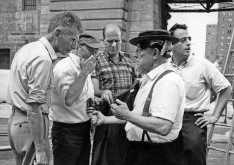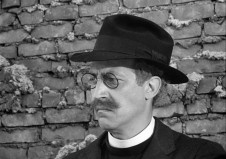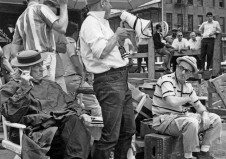Notfilm and "Film"

Beckett, Schneider, and Keaton on the set of "Film"
The American Cinematheque and Los Angeles Filmforum present
Notfilm and “Film”
At the Aero Theatre, 1328 Montana Ave., Santa Monica CA 90403
http://www.americancinemathequecalendar.com/content/notfilm-0
with additional screenings
Fri April 1 at the Spielberg Theatre at the Egyptian
Mon April 4 at the Laemmle NoHo 7 in North Hollywood
Tues April 5 at the Laemmle Playhouse 7, Pasadena
Wed April 6 at the Laemmle Ahrya Fine Arts in Beverly Hills
Thurs April 7 at the Laemmle Claremont 5
Fri April 8 at the Spielberg Theatre at the Egyptian
Sat April 9 at the Spielberg Theatre at the Egyptian
The culmination of a seven-year filmmaking journey, Ross Lipman’s cinema documentary Notfilm is a meditative and mesmerizing exploration of one of the strangest ventures in cinema history—a collaboration between Irish playwright (and future Nobel Prize winner) Samuel Beckett and comic genius Buster Keaton. Amy Heller and Dennis Doros of Milestone produced Notfilm and it is filmmaker Lipman’s first feature.
"Lipman finds in 'Film' genuine insights about Beckett’s work as a whole, and even about the nature of the movies." - Sidhartha Mahanta, The New Yorker
“Ambitious, thrilling and illuminating… Notfilm represents an invaluable addition to Beckett scholarship. Superb.” — James Knowlson, OBE (Beckett’s biographer and founder of the Samuel Beckett Archive)
“A two-hour documentary film about a half-hour film sounds ridiculous, but not if the film is Samuel Beckett’s Film. The confluence of Beckett, Buster Keaton and Alan Schneider is joined by Ross Lipman, who functions here as a cultural archaeologist of the highest order. Notfilm joins the very short list of great movies about the movies.” — Scott Eyman (film historian and author of John Wayne: The Life and Legend)
A new review in the Village Voice:
http://www.villagevoice.com/film/ross-lipmans-doc-notfilm-actually-enriches-samuel-becketts-only-film-work-8450766
Filmforum co-presents four screenings at the American Cinematheque and additional screenings at Laemmle Theatres, most with guests!
America Cinematheque screenings, tickets available in advance through Fandango:
Friday April 1 – at the Spielberg Theatre at the Egyptian
http://www.fandango.com/egyptiantheatrehollywood_aaofx/theaterpage?date=4/1/2016
Saturday April 2 – at the Aero Theatre, Santa Monica
http://www.fandango.com/americancinemathequeattheaerotheatre_aacpd/theaterpage?date=4/2/2016
Laemmle Theatre screenings April 4-7:
https://www.laemmle.com/search?q=NOTFILM&x=0&y=0
Friday April 8 – at the Spielberg Theatre at the Egyptian
http://www.fandango.com/egyptiantheatrehollywood_aaofx/theaterpage?date=4/8/2016
Saturday April 9 – at the Spielberg Theatre at the Egyptian
http://www.fandango.com/egyptiantheatrehollywood_aaofx/theaterpage?date=4/9/2016
Trailer: https://www.youtube.com/watch?v=vaqX9b_B6rA
Screening:
“Film”
(1965, 20 min. Dir. Alan Schneider).
Buster Keaton stars as a man trying to escape from perception of all kinds in this near-silent avant-garde short penned by Samuel Beckett.
Notfilm
(2015, Milestone Films, 128 min, Dir: Ross Lipman)
Nobel Prize winner Samuel Beckett’s only screenplay was for a visionary 1965 short starring Buster Keaton; while working to restore it, archivist-filmmaker Ross Lipman discovered missing footage and fell under the spell of this cinematic curiosity. The resulting kino-essay exploring the making and meaning of “Film” includes outtakes, previously unreleased audio of production meetings and other rare archival elements, along with numerous interviews.
Lipman, a renowned film restorationist (Killer of Sheep, The Connection, Shadows, Wanda) and independent filmmaker, first encountered Film decades ago when he read Beckett’s published screenplay for the short film shot in New York City in the summer of 1964.
Years later, when he learned that Film needed restoration, Lipman sought out its producer Barney Rosset, the maverick publisher whose many legal battles against censorship enabled Americans to discover the writings of William Burroughs, D. H. Lawrence, and many others.
During one of their many meetings in Rosset’s New York walkup apartment, Lipman inquired if there were any outtakes from that legendary film shoot. Rosset replied no…but that he did have some “scrap” in a cupboard. Lipman then foraged under the kitchen sink, where he found piles of rusty film cans, unopened for many years.
When he examined the footage, Lipman discovered a long-lost sequence, described by Rosset a few years before his death in 2012:
Originally, Film was meant to run nearly thirty minutes. Eight of those minutes were to have been used in one very long shot in which a number of actors would make their only appearance… Sad to say… the extremely difficult shot was ruined by a stroboscopic effect that caused the images to jump around. We went on without that shot. Beckett averted this incipient disaster by removing the scene from the script.
Inspired by this astonishing discovery, Lipman began to envision a film about the making of Film. His ambition was further charged when Rosset delivered more than two hours of audio recordings from Film’s production, including impassioned conversations between the rarely recorded Beckett, director Alan Schneider, cinematographer Boris Kaufman, and Rossett. Until this discovery, there were only small fragments of Beckett’s melodious Irish voice on tape or video, totaling just a few minutes.
To explore both the making of Film and its larger meaning, Lipman sought out Beckett’s beloved actress Billie Whitelaw, close friend and biographer James Knowlson, Alan Schneider’s widow Jean Schneider, Rosset’s childhood friend Haskell Wexler, and Rosset himself. Lipman also interviewed film historians Kevin Brownlow—who was able to shed light on both Beckett’s and Keaton’s thoughts about their collaboration—and Leonard Maltin, who actually visited the set of Film as a 14-year-old silent film fan.
Weaving together these interviews, his own insights into film history, clips from Film, scenes from Buster Keaton comedies, and other materials, Lipman has created a wonderfully absorbing and beautiful “kino essay.” Famed composer Mihály Víg’s score, at times melodic and at others, boisterous, adds to Notfilm’s seductive charm.
---------------------------
This program is supported by the Los Angeles County Board of Supervisors through the Los Angeles County Arts Commission; the Department of Cultural Affairs, City of Los Angeles; and Bloomberg Philanthropies. We also depend on our members, ticket buyers, and individual donors.
Los Angeles Filmforum is the city’s longest-running organization dedicated to weekly screenings of experimental film, documentaries, video art, and experimental animation. 2016 is our 41st year.
Coming Soon to Los Angeles Filmforum:
April 3 – Chantal Akerman, South (Sud), at the Egyptian Theatre
April 17 - Saul Levine, at the Egyptian Theatre
April 24 - David Domingo, super 8 from Spain, at the Egyptian Theatre
May 12 – Tacita Dean (at MOCA)
Memberships available, $70 single, $115 dual, or $50 single student
Contact us at lafilmforum@yahoo.com.
Find us online at http://lafilmforum.org.
Become a fan on Facebook and follow us on Twitter @LosAngFilmforum!

James Karen in "Film"
"Film"
(1965, 20 min. Dir. Alan Schneider).
Buster Keaton stars as a man trying to escape from perception of all kinds in this near-silent avant-garde short penned by Samuel Beckett.

NOTFILM, by Ross Lipman
Notfilm
(2015, Milestone Films, 128 min, Dir: Ross Lipman)
Nobel Prize winner Samuel Beckett’s only screenplay was for a visionary 1965 short starring Buster Keaton; while working to restore it, archivist-filmmaker Ross Lipman discovered missing footage and fell under the spell of this cinematic curiosity. The resulting kino-essay exploring the making and meaning of “Film” includes outtakes, previously unreleased audio of production meetings and other rare archival elements, along with numerous interviews.
Lipman, a renowned film restorationist (Killer of Sheep, The Connection, Shadows, Wanda) and independent filmmaker, first encountered Film decades ago when he read Beckett’s published screenplay for the short film shot in New York City in the summer of 1964.
Years later, when he learned that Film needed restoration, Lipman sought out its producer Barney Rosset, the maverick publisher whose many legal battles against censorship enabled Americans to discover the writings of William Burroughs, D. H. Lawrence, and many others.
During one of their many meetings in Rosset’s New York walkup apartment, Lipman inquired if there were any outtakes from that legendary film shoot. Rosset replied no…but that he did have some “scrap” in a cupboard. Lipman then foraged under the kitchen sink, where he found piles of rusty film cans, unopened for many years.
When he examined the footage, Lipman discovered a long-lost sequence, described by Rosset a few years before his death in 2012:
Originally, Film was meant to run nearly thirty minutes. Eight of those minutes were to have been used in one very long shot in which a number of actors would make their only appearance… Sad to say… the extremely difficult shot was ruined by a stroboscopic effect that caused the images to jump around. We went on without that shot. Beckett averted this incipient disaster by removing the scene from the script.
Inspired by this astonishing discovery, Lipman began to envision a film about the making of Film. His ambition was further charged when Rosset delivered more than two hours of audio recordings from Film’s production, including impassioned conversations between the rarely recorded Beckett, director Alan Schneider, cinematographer Boris Kaufman, and Rossett. Until this discovery, there were only small fragments of Beckett’s melodious Irish voice on tape or video, totaling just a few minutes.
To explore both the making of Film and its larger meaning, Lipman sought out Beckett’s beloved actress Billie Whitelaw, close friend and biographer James Knowlson, Alan Schneider’s widow Jean Schneider, Rosset’s childhood friend Haskell Wexler, and Rosset himself. Lipman also interviewed film historians Kevin Brownlow—who was able to shed light on both Beckett’s and Keaton’s thoughts about their collaboration—and Leonard Maltin, who actually visited the set of Film as a 14-year-old silent film fan.
Weaving together these interviews, his own insights into film history, clips from Film, scenes from Buster Keaton comedies, and other materials, Lipman has created a wonderfully absorbing and beautiful “kino essay.” Famed composer Mihály Víg’s score, at times melodic and at others, boisterous, adds to Notfilm’s seductive charm.
